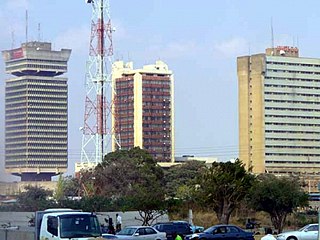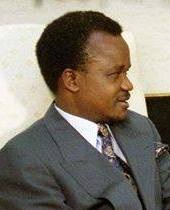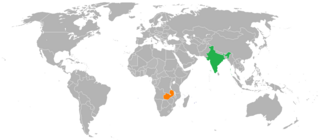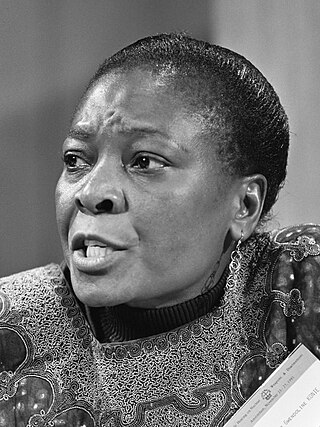 | |
Turkey | Zambia |
|---|---|
Turkey's embassy in Lusaka opened in 2011 and the Zambian embassy in Ankara opened in 2013. [1]
 | |
Turkey | Zambia |
|---|---|
Turkey's embassy in Lusaka opened in 2011 and the Zambian embassy in Ankara opened in 2013. [1]
Turkey had excellent relations with Zambia under its founding president, Kenneth Kaunda. He was admired in Turkey for his opposition to colonialism and racism. As a Frontline State in the struggle for Rhodesia to achieve majority rule as Zimbabwe, Zambia cooperated with Turkey in opposing Apartheid in South Africa. [2]
Because 95% of all Zambian imports and exports used Rhodesian railroads, when the British embargo against Rhodesian petroleum products caused Zambia’s economy to collapse. In 1966, Turkey, along with Canada, Great Britain, and the United States responded to Zambian shortage of petroleum products by airlifting fuel supplies until an oil pipeline between Tanzania and Zambia was completed in August 1968. [2]
Following the election of Frederick Chiluba in Zambia, bilateral relations cooled because of the rampant corruption Frederick Chiluba engaged in. [2] A British court on May 4, 2007 would go on to find him guilty of having stolen US$ 46 million.
| Guest | Host | Place of visit | Date of visit |
|---|---|---|---|
| | | Lusaka | July 28, 2018 [1] |
| | | Presidential Complex, Ankara | July 8–10, 2018 [1] |

Kenneth Kaunda, also known as KK, was a Zambian politician who served as the first president of Zambia from 1964 to 1991. He was at the forefront of the struggle for independence from British rule. Dissatisfied with Harry Nkumbula's leadership of the Northern Rhodesian African National Congress, he broke away and founded the Zambian African National Congress, later becoming the head of the socialist United National Independence Party (UNIP).

Zambia, officially the Republic of Zambia, is a landlocked country at the crossroads of Central, Southern and East Africa. It is typically referred to being in South-Central Africa or Southern Africa. It is bordered to the north by Democratic Republic of the Congo, Tanzania to the north-east, Malawi to the east, Mozambique to the southeast, Zimbabwe and Botswana to the south, Namibia to the southwest, and Angola to the west. The capital city of Zambia is Lusaka, located in the south-central part of Zambia. The population is concentrated mainly around Lusaka in the south and the Copperbelt Province to the north, the core economic hubs of the country.
The history of Zambia experienced many stages from colonisation to independence from Britain on 24 October 1964. Northern Rhodesia became a British sphere of influence in the present-day region of Zambia in 1888, and was officially proclaimed a British protectorate in 1924. After many years of suggested mergers, Southern Rhodesia, Northern Rhodesia, and Nyasaland were merged into the British Federation of Rhodesia and Nyasaland.

The politics of Zambia takes place in a framework of a presidential representative democratic republic, whereby the president of Zambia is head of state, head of government and leader of a multi-party system. Executive power is exercised by the government, while legislative power is vested in both the government and parliament. Formerly Northern Rhodesia, Zambia became a republic immediately upon attaining independence in October 1964.

Zambia is a developing country, and it achieved middle-income status in 2011. Through the first decade of the 21st century, the economy of Zambia was one of the fastest-growing economies in Africa, and its capital, Lusaka, the fastest-growing city in the Southern African Development Community (SADC). Zambia's economic performance has stalled in recent years due to declining copper prices, significant fiscal deficits, and energy shortages.

The Zambian Defence Force is the military of Zambia. It consists of the Zambian Army, the Zambian Air Force, and the Zambia National Service. The defence forces were formed at Zambian independence on 24 October 1964, from constituent units of the dissolved Federation of Rhodesia and Nyasaland Armed Forces. During the 1970s and 1980s, it played a key role in a number of regional conflicts, namely the South African Border War and Rhodesian Bush War. Being a landlocked country Zambia has no navy, although the Zambian Army maintains a maritime patrol unit for maintaining security on inland bodies of water.

After independence in 1964 the foreign relations of Zambia were mostly focused on supporting liberation movements in other countries in Southern Africa, such as the African National Congress and SWAPO. During the Cold War Zambia was a member of the Non-Aligned Movement.

Frederick Jacob Titus Chiluba was a Zambian politician who was the second president of Zambia from 1991 to 2002. Chiluba, a trade union leader, won the country's multi-party presidential election in 1991 as the candidate of the Movement for Multi-party Democracy (MMD), defeating long-time President Kenneth Kaunda. He was re-elected in 1996. As he was unable to run for a third term in 2001, former Vice President Levy Mwanawasa instead ran as the MMD candidate and succeeded him. After leaving office, Chiluba was the subject of a long investigation and trial regarding alleged corruption; he was eventually acquitted in 2009.

The president of Zambia is the head of state and the head of government of Zambia. The office was first held by Kenneth Kaunda following independence in 1964. Since 1991, when Kaunda left the presidency, the office has been held by seven others: Frederick Chiluba, Levy Mwanawasa, Rupiah Banda, Michael Sata, Edgar Lungu and the current president Hakainde Hichilema, who won the 2021 presidential election. In addition, acting president Guy Scott served in an interim capacity after the death of President Michael Sata.
Christianity has been very much at the heart of religion in Zambia since the European colonial explorations into the interior of Africa in the mid 19th century. The area features heavily in the accounts of David Livingstone's journeys in Central Africa.

Russia–Zambia relations are the bilateral relations between Russia and Zambia.
Emmanuel Kasonde was a Zambian economist and politician who served as the Finance permanent secretary or Minister of Finance under three successive Zambian presidential administrations, including Kenneth Kaunda, Frederick Chiluba and Levy Mwanawasa.

Foreign relations exist between Bahrain and Turkey. Turkey's historic relationship with Bahrain has wavered between indifference and courtship, but the constant has been a layer of mistrust emanating from both ends that appears to have been set aside in 2002 when the new Turkish government reversed the status quo and embraced a policy of engagement that has successfully catapulted the country to becoming a leading economic player in the Bahrain.

Denmark–Zambia relations refers to the historical and current bilateral relationship between Denmark and Zambia. Denmark has an embassy in Lusaka, and Zambia is represented in Denmark, through its embassy in Stockholm, Sweden. In 1980, relations were described as "warm".

India–Zambia relations are bilateral diplomatic relations between India and Zambia. India maintains a High Commission of India in Lusaka that is concurrently accredited to Malawi while Zambia has a High Commission in New Delhi.

Gwendoline Noreen Chomba Konie was a Zambian poet, diplomat and politician. She was the Zambian ambassador to Scandinavia, the United Nations and Germany. She formed her own party in 2000 and stood as a candidate to be the President of Zambia in 2001. When she died she was given a state funeral.

Tanzania– Zambia relations are bilateral relations between Tanzania and Zambia. Tanzania and Zambia are one of the oldest allies in the region and together formed the front line nations for independence for neighboring African nations. Both nations are part of the Southern African Development Community, African Union and Non-Aligned Movement.
Timeline of Zambia (Northern Rhodesia)

Turkey has an embassy in Harare. Zimbabwe opened its embassy in Ankara on October 3, 2019.

Embassy Park Presidential Burial Site, commonly referred to as Embassy Park or Embassy Memorial Park, is a national monument in Lusaka,Zambia. It serves as the official burial place for the country's presidents and is a site of immense historical and cultural significance. Designated as a National Monument in 2009, Embassy Park is also known to be a symbol of Zambia's political and social heritage. The site honours the contributions of the country's leaders towards its growth and development. Among those buried here are Kenneth Kaunda, the first president of Zambia, Frederick Chiluba, the second president, Levy Mwanawasa, the third president, Rupiah Banda, the fourth president, and Michael Sata, the fifth president. The park is accessible to the public and also provides a platform for visitors to pay their respects to Zambia's former presidents and to learn more about the country's cultural and political background.